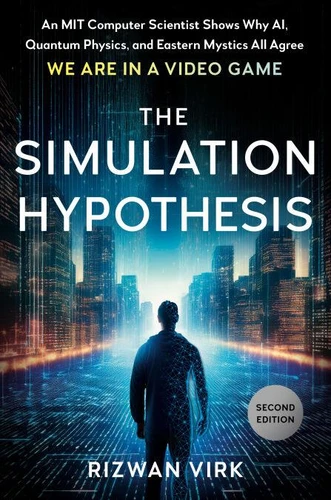Nouveauté
The Simulation Hypothesis. An MIT Computer Scientist Shows Why AI, Quantum Physics, and Eastern Mystics All Agree We Are in a Video Game
Par :Formats :
Disponible dans votre compte client Decitre ou Furet du Nord dès validation de votre commande. Le format ePub protégé est :
- Compatible avec une lecture sur My Vivlio (smartphone, tablette, ordinateur)
- Compatible avec une lecture sur liseuses Vivlio
- Pour les liseuses autres que Vivlio, vous devez utiliser le logiciel Adobe Digital Edition. Non compatible avec la lecture sur les liseuses Kindle, Remarkable et Sony
- Non compatible avec un achat hors France métropolitaine
 , qui est-ce ?
, qui est-ce ?Notre partenaire de plateforme de lecture numérique où vous retrouverez l'ensemble de vos ebooks gratuitement
Pour en savoir plus sur nos ebooks, consultez notre aide en ligne ici
- Nombre de pages400
- FormatePub
- ISBN978-0-593-85496-9
- EAN9780593854969
- Date de parution22/07/2025
- Protection num.Adobe DRM
- Taille20 Mo
- Infos supplémentairesepub
- ÉditeurTarcher
Résumé
The definitive exploration of one of the most daring and consequential theories of our time, completely revised and updated to reflect the rapid advances in artificial intelligence and virtual realityAre we living in a simulation? MIT computer scientist Rizwan Virk draws from research and concepts from computer science, artificial intelligence, video games, quantum physics, and ancient mystics to explain why we may be living inside a simulated reality like the Matrix.
Simulation theory explains some of the biggest mysteries of quantum and relativistic physics, such as quantum indeterminacy, parallel universes, and the integral nature of the speed of light, using information and computation. Virk shows how the evolution of our video games, including virtual reality, augmented reality, artificial intelligence, and quantum computing, will lead us to a technological singularity.
We will reach the simulation point, where we can develop all-encompassing virtual worlds like the OASIS in Ready Player One or The Matrix-and in fact we are already likely inside such a simulation. While the idea sounds like science fiction, many scientists, engineers, and professors have given the simulation hypothesis serious consideration, including Elon Musk, Neil deGrasse Tyson, and Nick Bostrom.
But the simulation hypothesis is not just a modern idea. Philosophers of all traditions have long contended that we are living in some kind of "illusion" and that there are other realities that we can access with our minds. The Simulation Hypothesis is the definitive book on simulation theory and is now completely updated to reflect the latest developments in artificial intelligence and virtual reality.
Whether you are a computer scientist, a fan of science fiction like the Matrix movies, a video game enthusiast, a spiritual seeker, or simply a fan of mind-bending thought experiments, you will never look at the world the same way again.
Simulation theory explains some of the biggest mysteries of quantum and relativistic physics, such as quantum indeterminacy, parallel universes, and the integral nature of the speed of light, using information and computation. Virk shows how the evolution of our video games, including virtual reality, augmented reality, artificial intelligence, and quantum computing, will lead us to a technological singularity.
We will reach the simulation point, where we can develop all-encompassing virtual worlds like the OASIS in Ready Player One or The Matrix-and in fact we are already likely inside such a simulation. While the idea sounds like science fiction, many scientists, engineers, and professors have given the simulation hypothesis serious consideration, including Elon Musk, Neil deGrasse Tyson, and Nick Bostrom.
But the simulation hypothesis is not just a modern idea. Philosophers of all traditions have long contended that we are living in some kind of "illusion" and that there are other realities that we can access with our minds. The Simulation Hypothesis is the definitive book on simulation theory and is now completely updated to reflect the latest developments in artificial intelligence and virtual reality.
Whether you are a computer scientist, a fan of science fiction like the Matrix movies, a video game enthusiast, a spiritual seeker, or simply a fan of mind-bending thought experiments, you will never look at the world the same way again.
The definitive exploration of one of the most daring and consequential theories of our time, completely revised and updated to reflect the rapid advances in artificial intelligence and virtual realityAre we living in a simulation? MIT computer scientist Rizwan Virk draws from research and concepts from computer science, artificial intelligence, video games, quantum physics, and ancient mystics to explain why we may be living inside a simulated reality like the Matrix.
Simulation theory explains some of the biggest mysteries of quantum and relativistic physics, such as quantum indeterminacy, parallel universes, and the integral nature of the speed of light, using information and computation. Virk shows how the evolution of our video games, including virtual reality, augmented reality, artificial intelligence, and quantum computing, will lead us to a technological singularity.
We will reach the simulation point, where we can develop all-encompassing virtual worlds like the OASIS in Ready Player One or The Matrix-and in fact we are already likely inside such a simulation. While the idea sounds like science fiction, many scientists, engineers, and professors have given the simulation hypothesis serious consideration, including Elon Musk, Neil deGrasse Tyson, and Nick Bostrom.
But the simulation hypothesis is not just a modern idea. Philosophers of all traditions have long contended that we are living in some kind of "illusion" and that there are other realities that we can access with our minds. The Simulation Hypothesis is the definitive book on simulation theory and is now completely updated to reflect the latest developments in artificial intelligence and virtual reality.
Whether you are a computer scientist, a fan of science fiction like the Matrix movies, a video game enthusiast, a spiritual seeker, or simply a fan of mind-bending thought experiments, you will never look at the world the same way again.
Simulation theory explains some of the biggest mysteries of quantum and relativistic physics, such as quantum indeterminacy, parallel universes, and the integral nature of the speed of light, using information and computation. Virk shows how the evolution of our video games, including virtual reality, augmented reality, artificial intelligence, and quantum computing, will lead us to a technological singularity.
We will reach the simulation point, where we can develop all-encompassing virtual worlds like the OASIS in Ready Player One or The Matrix-and in fact we are already likely inside such a simulation. While the idea sounds like science fiction, many scientists, engineers, and professors have given the simulation hypothesis serious consideration, including Elon Musk, Neil deGrasse Tyson, and Nick Bostrom.
But the simulation hypothesis is not just a modern idea. Philosophers of all traditions have long contended that we are living in some kind of "illusion" and that there are other realities that we can access with our minds. The Simulation Hypothesis is the definitive book on simulation theory and is now completely updated to reflect the latest developments in artificial intelligence and virtual reality.
Whether you are a computer scientist, a fan of science fiction like the Matrix movies, a video game enthusiast, a spiritual seeker, or simply a fan of mind-bending thought experiments, you will never look at the world the same way again.






